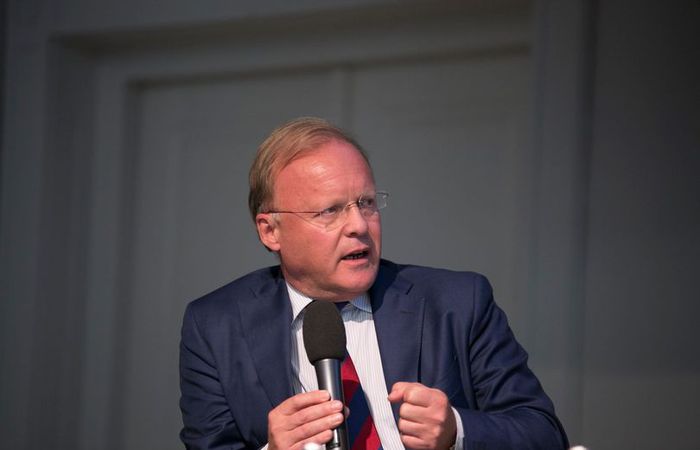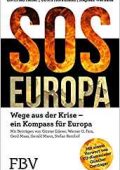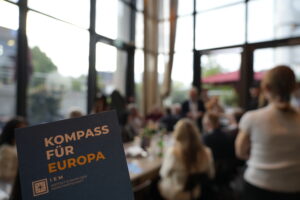Stephan Werhahn, grandson of one of the biggest statesmen of the post-war Europe, Konrad Adenauer, warns that the European Union will collapse if opportunism, selfishness and protectionism of the member states continue, and consequences will be devastating. He is proposing European republic as a solution.
Here the original article published in Slovenia: ‚Današnji politiki so strahopetci. Evropa pa bo kmalu postala muzej, ki ga bodo obiskovali kitajski turisti‘ – München, 04.03.2018, 8:52 | Posodobljeno pred 5 dnevi
Dr. Stephan Werhahn has two passions. Business and politics – both being part of his life since he was born. While one side of his family is running a successful business, the other side was deeply involved with politics. In 1953, when Werhahn was born in german town Neuss by the river Rhine, his grandfather Konrad Adenauer served as the first chancellor of the Federal Republic of Germany (West Germany).
Adenauer, who was in charge of the country from 1949 until 1963, was not interested in building shiny new buildings on shaky ground of post-war ruins. He was interested in building solid, peaceful country and with that, together with like minded statesmen, he created the project that we today know as the European Union.
Adenauer, a man of firm beliefs and values, paid a high price for staying true to his political vision and personal beliefs. After Adolf Hitler came to power in 1933, Adenauer lost his position as mayor of Cologne and president of the Prussian State Council. As Roman Catholic and Hitler opponent, he was constantly being watched. After allegations that he was involved in the alleged attempt to kill Hitler on june 20th, 1944, the regime became determined to lock him up. To find him, they have even tortured his wife to the point where she broke down. The guilt of betrayal stayed with Auguste Adenauer, who in 1948 died after trying to commit suicide.
Adenauer survived the war and in 1949 became appointed as chancellor. Part of that era was closely followed by the guest of this interview.
“Ever since I remember, talking about politics was an everyday thing in my family. Especially since my mother Libet had been one of the three Adenauer daughters and she accompanied him to many state visits. Among others to the USA in 1962 when he visited John F. Kennedy. She had a cordial relationship with his wife Jackie, who was a similar age as my mother. One of the most important trips of that nature was of course the trip to France, when Adenauer and Charles de Gaulle signed the Elysée Treaty, the contract that signified old enemies Germany and France burying the hatchet and stepping into the future as friendly nations.
Both statesmen wanted to sign the treaty in the presence of their families since De Gaulle, an army man, felt that his army was not yet ready to close the peace deal after more than 100 years of conflict with the neighboring country, and Adenauer really couldn’t come to the signing with any kind of representation of power since he was representing a country that lost a war and was basically begging to come back to the West. So the signing became a family affair. I was ten years old at the time and was watching all that with a lot of enthusiasm.
I remember the time when Kennedy came to Berlin and said that now famous words “I am a Berliner”. Or when De Gaulle came campaigning for the Treaty. After so much war it was hard for people to understand how things can transition into peace. That was a new world for them. One of the more vivid memories is also the death of Kennedy. My parents were completely shocked. It was like a family member had died.”
Later Stephan Werhahn studied law, economics and obtained Ph.D. in philosophy. He even became a politician himself. For more than 40 years he was a member of CDU, Christian Democratic Union of Germany, the party that his grandfather founded. Later he put some distance between himself and the party politics, feeling that it strayed too much from the vision that would bring progress and prosperity to Germany and to the EU.
Mr Werhahn, what are your memories of your grandfather?
Me and his other grandchildren usually met him three times a year. January fifth was his birthday, an official affair. Then in May or June we usually went to his house to pick cherries. And we didn’t just eat them, we would sell them to the people who came by the fence to see Adenauer home. I guess those were the early signs of my talent for business.
And the third opportunity to spend time with grandfather was each year on December 26th, day after Christmas. It’s the name day of St. Stefan, a patron who I was named after. He usually gave me present on that day and it was usually something really special. He brought a lot of interesting things from his visits abroad since other statesmen knew he had a lot of grandchildren, they often gave him extra presents for us. I remember that he brought hovercraft from Texas and when I showed it to my peers at school they were pretty jealous.
Even after he wasn’t chancellor any longer, politics stayed part of our life. In the four years between his retirement and his death a lot has happened, in Germany and globally. I was fourteen when he died. Even his funeral was a big event with most important world leaders attending the service.
While you were growing up, European project was also growing ...
Yes and even then tensions were obvious. Even back then there was a question of Great Britain- whether the country should be part of the EU or not. De Gaulle was against it because he wanted France to be the first nuclear power on the continent. He even went so far that he turned to Moscow. He believed that European continent should reach from the Atlantic to Ural. And he saw it without British or too much of American influence.
Adenauer was against such plans since he saw Russia in a completely different light- as a threat that could potentially endanger Europe. However, Great Britain became a member of the EU only after both De Gaulle and Adenauer already left.
All this time there was also an internal fight going on inside German politics. There was a question of who to build an alliance with- Europeans or Americans who were much safer choice at the first sight because they could help in case of Soviet invasion. And those were the times when fear of a new war and Russians was growing.
So from that perspective, choosing Europe and European Union project was even more hazardous and important at the same time.
The biggest threat at the time was lurking from the east and the idea was to have as many close allies as possible if the worst happens. So the best place for Germany was strong and united Europe. And at the same time that also represented boundaries for Germany and gave reasurrence to the rest of the Europe that Germany isn’t a threat anymore. So setting up this new environment meant that members could focus on economic and social issues, instead of on buying more weapons.
What would Adenauer think of today’s European Union?
That its performance is mediocre. It’s not the best or the worst situation. But let’s not be blinded by the fact that the wheels of the EU are still turning. The risk of the project falling apart is huge. The bonds between member states are not strong, the majority of members is acting selfish, they are calculating how to give as little a possible and get as much as possible, national interests are becoming way more important than what’s best for everyone.
Spain, Ireland an Portugal can right now be seen as the good guys. Those are the countries that did their homework, that went trough with reforms, came back to the markets an are showing a strong desire to move forward. Many countries, hit by the financial crisis, didn’t do that.
As far as following the original vision for the EU as a place of peace and economic growth, I think that we have reached only about 50 percent of our capacity. And if opportunism, selfishness and protectionism continue, the EU will fall apart.
Why so much egoism?
On one side, I think a lot of it is a manifestation of fear and on the other side people are not familiar with the idea of the EU anymore. It’s not internalized by people, it’s not even well represented to them.
Let’s take Italy election campaign, for example. The majority of politicians used the EU during the campaign as a scapegoat for everything that is wrong in the country. Their argument was – if the EU would change, Italy wouldn’t have to change. So, instead of politicians finally admitting that they are going to have to change themselves and their country if we want a strong and relevant EU, they are trying to keep the status quo. They are clutching at straws instead of addressing the issues. In case of Italy that would be the question how to get to the point where people again can see at least some perspective in a country buried under a pile of debts that will probably never be repaid, where people feel they are victims of digitization and globalization and see that their once so proud country is missing out on a global stage.
The problem are the politicians who don’t have the courage to tell to their people that changes are urgent and inevitable. Those politicians are just a bunch of cowards.
Fortunately, there are some better examples in the European politics. Like french president Emanuel Macron who wasn’t afraid to lose some popularity points in order to explain to his people how serious the situation is and how much changes are needed if they want to have a future. You will never hear an Italian politician say that. They will use whatever, so they don’t have to say that out loud. They will see protectionism as a solution and that will have a devastating long term effects. The market will shrink, unemployment will grow and there will be an even less perspective for people.
Painting the EU as a scapegoat is a handy but dangerous game.
Are those politicians aware of the danger?
They don’t care. They worry more about the shirt they are wearing that the coat that is keeping everyone warm. You see, the EU won’t change the way that Italians would like for it to change. Those kind of wishes are simply illusions. And the victims of those illusions will be the economy and people.
We see that also in Germany, where politics gives out this little treats to people to keep them calm. But the result of that is that the money that should be spent on investments that are important for our future, is being spent to “repair the supposed injustices “. Usually the money is used to increase benefits for mothers or elderly. The problem is that there is no universal justice and that someone always ends up in a disadvantaged position. And while we should take care of the underprivileged, we should not spend billions to put out little fires while there is a danger of the whole forest burning down. If we would spend that money on energy projects, digitization, development and infrastructure, we would all live better from the long term perspective.
I was disappointed that Jamaica coalition talks didn’t go very far after german elections. I think that would have brought renewal not only for german, but also European politics. And we need that renewal if we want to keep enjoying the benefits of the single European market and the EU.
Unfortunately, we are now facing lack of subsidiarity, European citizens are not part of the decision making. Right now we are trying to solve all that issues at the top level of the EU decision making even though many of those issues would be better solved at the local level, while top level should be dealing with geopolitical issues for example.
Right now it seems that politics is Brussels is only dealing with less important issues while big decisions and questions of the visions for the future are somehow being overlooked ...
True. Which is why there is so much anger among Europeans. Politics in Brussels is taking authority away from people even though they could easily solve many issues without its help, while neglecting its core job – building vision and defending geopolitical interests of the EU. If subsidiarity would work in the EU, we probably won’t even have Catalan independence movement.
Ineffectiveness of Brussels can partially be blamed on how MEP’s are being elected. We have no pan-European political party, no pan-European media and much less pan-European identity. And this is why national interests are taking over, pushing the EU interests into the background. At the end of the day we have 27 different interests, 27 different opinions, that then represent the base for compromising. And the result of that are weak solutions that make everyone happy, but don’t do any good because they don’t have any substance. And that is definitely not the most effective way to run the continent.
At the beginning there was a pursuit for peace and economic growth ... what is keeping members of the EU together today?
Unfortunately, people have lost sight of why the EU exists and politicians should honesty explain that to them. If we have countries where all the politicians are screaming how mean the EU is to the “poor country” then we will soon loose another member state. The EU right now has no way to directly defend itself in that kind of situation. So one of the priorities is to improve communication, preferably via an all-European media.
I would also advocate for European citizenship, a digital identity that would carry all the rights of the EU citizens, even across borders. They would be able to use their rights all over the continent. With that a lot of nationalist issues would disappear. It wouldn’t matter if you are German, Italian, Slovenian … as Europeans, people would find it much easier to identify with the EU.
People also need to understand how world without the EU would look like. We would go to national currencies, border controls would return, security and weapons expenses would grow, without joint climate politics, pollution would get worse, because of different standards in building infrastructure we would be back to the point where trains can cross borders …
How long would peace last after Europe would fall apart?
For a very short period of time. You see, in a nationalistic world you have the “me first and then no one else for a long time” mentality. That is also what US president Donald Trump seems to believe. The problem is that this is the epitome of selfishness and it always leads to trouble. In that scenario Europe would go back to being a jungle where the biggest bully takes it all. It’s the philosophy that kills.
It’s a little more than a year until the next European elections. Do you think that right challenges will be addressed during the campaign?
No, it’s too late for that. If you want to make changes you need to start at least two and a half years before the elections, so that people can understand the idea. I believe that we need a pan-European movement. The movement should gather at least up to 10 percent of the votes in order to be able to start campaigning for changes. We should start a wide and thorough debate about European republic, its vision and its constitution. I’m sure it would be a long and complicated process, but it could work if all the member states would understand that it is an absolutely necessary solution.
I don’t think that the picture of what will happen if we don’t put the EU back in order is clear enough. We will lose peace, economic welfare, our position in the globalized world. China, Russia, USA and migrants will tear us apart. Each country will become a little province with foreign rulers. Let’s take Slovenia, for example. What power would such a small country have on its own? Very little and the same goes for the majority of the EU member states. Even the biggest members would become much more insignificant. And then the Chinese will come and have a harvest. They will buy the best technology, the best companies, some of them will come just as tourists. Europe will become a museum for tourists. In the best case scenario. In the worst case Europe will literally burn. We will lose what we have and no one in the world will care – that’s how insignificant we will become.
That’s a very bleak picture. But considering the current political situation I assume it would be extremely difficult to gather support for your idea of European republic. There are no signs of countries being interested in more integration.
I agree that it would be difficult to gather support and arguments in support of the idea should be presented in a very clear way. But on the other hand, we as a society should be able to understand how big are the challenges that we are facing, especially globalization and digitization. While people in Europe can clearly see that Europe is losing out on both of those topics compared to China or the USA, they unfortunately don’t see that the biggest losers will be those who will close themselves behind the national borders.
We have trouble with determining the real reasons why we are losing our geopolitical power. We should not believe populists. It is laughable when someone claims superiority of his country, rejects any type of reforms, but at the same time wants to keep all the EU privileges and expects that the whole world will change to his liking. Ridiculous and short sighted. People should see that politicians who say that are not politicians but cowards.
The system needs to be transparent, open and trustworthy. Whoever isn’t willing to play by these rules needs to be gone. In this case I would actually argue for the concept of the EU of two speeds. Those who want to move forward should be able to do that and those who want to put themselves out to the periphery should be allowed to do that as well, but without any financial help from the progressive group. Any country that elects a government that slows down progress is, for the lack of a better word, stupid and on a dangerous path to become a museum. Italy already has many museums. Bleak future could mean even more museums and more migrants than Italians.
Speaking of migrants … Migrant crisis was the latest key moment when all the differences and disagreements between member states came to light.
n theory the best solution would be for each member state to accept as many migrants as its society and social security system can assimilate. In reality some countries had to carry much larger burden of the migrant crisis that others and that led to disagreements. But also something else came to light. In countries where open market isn’t fully functional yet, people got scared that migrants will take away their opportunities, and the system got scared that migrations are going to be the last straw that enforces changes. So now we have Hungary, where the government is trying to destabilize the liberal system under false pretenses of protecting the country from migrants. And Poland where democracy is in serious jeopardy. This is how core EU values are being endangered.
Of course the EU should also do its homework. The most important here is the question of security. You cannot have free movement inside the EU without a flawless security system to protect its borders. If the countries would feel safe there would be a much less backlash to decisions made in Brussels. When it comes to security it must be clear that there is working European solution an people are not left at the mercy of their current leader. But at the same time, countries need to feel they are not losing their sovereignty. Which is why the subsidiarity principle must be implemented. To achieve that you need the European constitution, working subsidiarity, independent juridical system, independent media and unbiased public opinion.
Many of the questions about how to reform the EU never got any answers because the financial crisis broke out and EU was to busy with saving countries that were the most hit by the financial crisis. Then financial crisis was followed by migrant crisis even before everything was solved. Do you think that the EU has successfully solved financial crisis?
A lot of countries for a really long time only saw the advantages of the eurozone. But the reallity is that for some of the countries this membership isn’t the best sollution. Eurozone has many advantages for countries like Germany because a relatively weak euro is helping their economy. But for weak countries euro became a trap. At first they were happy because euro meant easier access to financial markets. But politics, based on taking out loans, is not sustainable on the long run. Unfortunately some countries saw that trap to late.
Now ECB is artificially keeping interest rates down, but since that is bad for banks and insurance companies it cannot last forever. So while the ECB right now keeps some southern European countries on life support, the reality is that sooner or later, those countries will have to face the reality of their debts and do something. Some will probably leave eurozone but all of them will be forced to go through with necessary reforms. Those same reforms they were unwilling to process before. The reforms that Mrs. Merkel and Mr. Schauble wanted them to do, but were instead called names and mrs. Merkel had a Hitler mustache drawn on her pictures. Those countries will act when they get poor enough. Poverty makes people take action.
Some would argue that new world order is needed and see the solution in ideas of mostly US tech giants who are supposedly advocating for fair distribution of wealth.
That’s an illusion. What this companies are actually doing is that they are trying to monopolize many sectors. And that has nothing to do with the fair distribution of wealth. Let’s take booking.com as an example. They take a rather large percentage of the earnings from the people who are advertising on their platform. They are getting rich without taking any risks since they don’t actually own any hotels or apartments. Or Uber. That is also not exactly a taxi company. This platforms offer a lot. But at the end of the day we should ask ourselves, who is making a profit, who is paying taxes and who is actually getting richer. And Europe isn’t having this debate. Actually, there is a debate, but no action. The commisioner isn’t even an expert in this field, and the EU is really slow when it comes to ICT innovation. Some companies in Germany are already aware of the importance and the potential of data, but many aren’t. We need our Google, Apple and those companies must pay taxes. Unfortunately, this is another case of “me first” politics where we have countries that are willing to let those companies pay extremely low or no taxes. There is really a lot of work that needs to be done.
How much time is there before it’ too late to make changes?
10 to 20 years. At the same time other parts of the world will also have to reform. China, for example, is growing really fast but also has many problems. But there is a big difference between them and us. They have vision, we don’t.
While they are travelling the world to buy the best technology and mines in Africa, we don’t pay enough attention to technology and in Africa we are still seen as bad guys from the colonial era. And while China is making a profit at Africa’s expense, Europe is getting migrants. While the truth is that they are coming from countries where also Europe did a lot of evil, unfortunately some of our today’s prosperity is the product of someone else’s suffering, it would be a really bad idea to bring people from there to Europe. What we need to do is to create opportunities where they can develop their own countries, develop their own markets and feed their own people.
Projections show that until 2050 the number of people living in Sub Saharan Africa should grow from 1,1 to 2,4 billion. The average birth rate per woman there is five children. Something that is unimaginable for today’s Europe. So we are talking about a huge population growth in a place where there are other issues like climate changes, the possibility of wars, political instability … Africa is certainly not lacking challenges but we need to help them to put their continent in order. Because China won’t do that. They even bring their own workforce to some of the mines they buy.
Unfortunately European work for Africa is not giving much results yet because for the past five years we have spent most of our time getting bodies out of the Mediterranean sea. Most of those people came from politically destabilized Lybia. Now we must make some urgent political decisions. We need to help people, but the approach must be systematic and effective.
European foreign politics must be more effective. Right now we are seeing the consequences of what some world powers caused in the Middle East, Africa … Putin is destabilizing Europe. Populists are destabilizing Europe. I am convinced that some of the political phenomena like Mr Orban wouldn’t even exist without the migrant crisis. We need to act on facts not fake news. We need to focus on how to help people on their home territory, otherwise migrant waves will destabilize Europe and affect the european way of life.
Europe went though enough wars, we shouldn’t repeat some devastating mistakes from our history. Especially we shouldn’t let Europe become a battleground for religious disputes, brought to us together with migrant waves. We need to protect peace and we need to act fast.
The future of our children and grandchildren depends on our ability to reform the EU back into an important global player. The basis for that is a clear vision, a clear goal. Unfortunately, right now our ship is not equipped for the storm ahead of us.
For a long time, especially many of the smaller European nations saw Germany as the captain of this ship.
When our government is again fully operational, talks with French, Italian and other governments will be necessary. We must talk about effective solutions. And we shouldn’t act like putting some paint or fixing some holes will be enough to save our ship. We need a clear vision of what our final destination is and how fast we need to sail to reach it. First, we need to be completely honest about the gravity of our situation. And the th French, Italian and some news. e lack of a better word, ‚Europeans should demand vision from their politicians.






